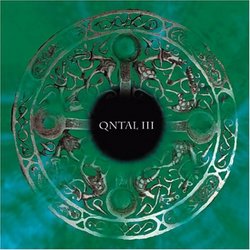| All Artists: Qntal Title: Qntal III Members Wishing: 1 Total Copies: 0 Label: Noir Release Date: 6/22/2004 Genres: Alternative Rock, International Music, Pop, Rock Style: Goth & Industrial Number of Discs: 1 SwapaCD Credits: 1 UPCs: 687132061422, 4047179069427, 718750321428 |
Search - Qntal :: Qntal III
 | Qntal Qntal III Genres: Alternative Rock, International Music, Pop, Rock
|
Larger Image |
CD Details |
CD ReviewsEmotionally Driven Heavenly Voices, Strings, and Electronics M. Mierzwa | Davis, CA USA | 10/25/2005 (5 out of 5 stars) "A number of years passed between the release of Qntal II and Qntal III: Tristan und Isolde. In that time Ernst Horn, of Deine Lakaien left Qntal and was replaced by Phillipp Groth. Like their two earlier albums, Qntal III is a perfect example of the ethereal or heavenly voices genre of music and will appeal to fans of bands like Dead Can Dance, Estampie, or Corvus Corax. Most of the songs have a nice blend of soft electronics, stringed instruments, and enchanting medieval vocals (many of which are sung in Latin). Many of the tracks from this album have worked their way to goth radio broadcasts and club floors in Europe and North America. A few of the songs I'd recommend listening to include: "Name der Rose", "Maiden in the Mor" in which Groth's guitar compliments Syrah's lovely vocals, "Ecce Gratum" with its male and female vocals, "Entre moi et mon amin", and "Vedes Amigo". The album is fantastic ... and you will not go wrong with any of its tracks. If you enjoyed this album, I'd also recommend checking out other European ethereal artists such as Love Is Colder Than Death, Helium Vola, Sophya, O Quam Tristis, and Collection D'Arnell Andrea (some of which you can find here on amazon)! " Mystical Music Based on a Medieval Romance Dancing Ganesha | Bangalore, India | 09/12/2004 (5 out of 5 stars) "With a classically trained vocalist and musicians hailing from Germany, along with music with themes based on the medieval story of "Tristan and Isolde," I was instantly drawn to this music and purchased it as soon as it was available. I can say that QNTAL is a pleasant surprise. Here you will find something that is deep, meaningful, and heartfelt, based on a medieval romance of Celtic/Germanic origin and influence; a mystical "soundscape" of sorts, or as the vocalist of QNTAL put it, a sort of "soundtrack" to a movie about "Tristan and Isolde," (if they ever made one.)" Unclassifiable, yet unforgettable Kimberly B. Stone | Colorado, USA | 02/20/2005 (5 out of 5 stars) "I came here to Amazon to read what others say about this CD, so that I might know better what to call it - in my head and in my iPod's genre category. I haven't found the right term yet, but that doesn't stop me from appreciating this CD a great deal. I have to call it New Age World Electronica. If you like Loreena McKennitt, Dead Can Dance or other world/folk inspired electronic new age music, you'll find this CD fascinating. I like all of Qntal's work, but this one really stands out."
|

 Track Listings (13) - Disc #1
Track Listings (13) - Disc #1